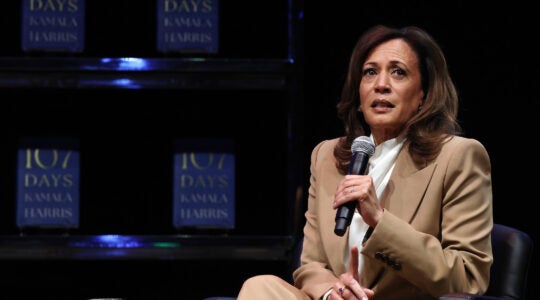WASHINGTON (JTA) – The Zionist Organization of America is making headway with its call on Palestinian Authority President Mahmoud Abbas to abrogate his Fatah party’s constitution before U.S.-backed peace talks convene in Annapolis, Md. later this month.
Only one problem: According to Palestinian officials, the offending Fatah document has been gone, dead and buried for nearly three decades.
Despite this claim, lawmakers and Jewish organizations are taking their lead from a ZOA ad that appeared in the New York Times on Oct. 18, listing the offending articles as “ten commandments,” including one calling for “the complete liberation of Palestine, and eradication of Zionist economic, political, military, and cultural existence.”
The Jewish community’s pre-eminent umbrella group on foreign affairs – the Conference of Presidents of Major American Jewish Organizations – is close to signing on to the ZOA’s campaign. In Congress, U.S. Rep. Roy Blunt (R-Mo.), the minority whip in the House of Representatives, and U.S. Rep. Shelley Berkley (D-Nev.), a prominent Jewish Democrat, have joined the fight, initiating a non-binding resolution that demands Abbas “officially abrogate the 10 articles in the Fatah Constitution that call for Israel’s destruction and terrorism against Israel, oppose any political solution to the Israeli-Palestinian conflict, and label Zionism as racism.”
But Afif Safieh, the director of the PLO’s office in Washington, told JTA that the Fatah charter – and its offending anti-Israel articles – are no longer valid. “It has been superseded by Fatah general congresses in 1980 in Damascus and in 1989 in Tunis,” Safieh said.
“Those who might invoke this issue are resurrecting a document that was ‘caduc’ long ago,” Safieh said, using the French term for “null and void” that the late Palestinian leader, Yasser Arafat, made famous in 1989 when he said offensive passages in the separate Palestine Liberation Organization charter were no longer relevant.
The current ZOA-led campaign mimics a similar to-and-fro in the 1990s over the PLO charter that was never satisfied to any party’s liking, despite the reconvening of the Palestine National Council in 1998 under the aegis of former President Bill Clinton.
Safieh said he suspects, then as now, the aim is to scuttle peace moves. “Those who are invoking this issue are ill inspired,” Safieh said.
ZOA’s spokesmen say the documentation chronicling the purported changes in the Fatah charter is sparse at best and that there is no proof of the charter’s formal renunciation.
“It would be a dangerous policy error to strengthen President Abbas with Israeli concessions, especially statehood, before he formally abrogates his ruling document promoting terror and Israel’s destruction,” ZOA President Morton Klein told JTA.
In making a case for the currency of the Fatah charter, ZOA cites the document’s appearance until October on www.fateh.net. That site, however, is based in Lebanon and seems unrelated to the existing Fatah Party, whose official website is www.fateh.ps. Unlike the official site, which lionizes Abbas, the fatah.net site does not even mention him, and offers only two biographies – of unknown Palestinians, apparantly radicals.
Independent experts on Fatah have had difficulty in tracking how exactly the Palestinian faction has evolved over the years.
“Fatah’s evolution adds up to a series of phases marked by oscillating shifts in emphasized bases of legitimacy,” wrote Anat Kurz of Tel Aviv University’s Jaffee Center in her 2005 book, “Fatah and the Politics of Violence.” The “shifting bases” Kurz referred to are political legitimacy on the one hand and violence on the other.
Nathan Brown of George Washington University, another expert on Fatah, said that members of the Palestinian faction speak of bylaws apparently adopted at the 1980 and 1989 congresses, but a compendium of these is hard to come by. Brown said he once saw such a compendium in the hands of a Fatah party official – the only evidence he has that one exists.
Nonetheless, Brown said, his Fatah interlocutors say the party is on board with recognizing Israel’s existence and advocating a two-state solution. “‘That’s the difference between us and Hamas,’ is what they say,” Brown said.
Another problem is that according to the original charter, the head of the movement does not have the unilateral power to convene another congress, which is what it would take to make constitutional changes; ZOA’s initiative, according to this view, amounts to calling on Abbas to rescind a document that says he has no such power.
These days Fatah hardly exists as an independent, functioning party, Brown said; power is concentrated mostly in Abbas and in the Palestinian Authority. “It’s more of a New Year’s or Halloween party than a political party,” Brown said.
In the 2006 Palestinian elections, different factions purporting to represent Fatah often ran in the same district, splitting the pro-Fatah vote. The breakdown helped Hamas, the terrorist group Abbas is now fighting, win the elections.
Palestinians in the West Bank are vaguely aware of the original charter’s opening “Six Principles,” which invoke armed struggle toward liberation but do not in themselves negate Israel’s existence. Once, prospective Fatah members were required to swear by the principles and perform some limited military duty. Now, observers in the West Bank say, all that is required is a nominal fee.
To the degree that the party functions now, it is toward convening another general congress – the one in 1989 was the most recent.
According to contemporary news accounts, the 1989 congress did go some way toward reversing the most toxic elements of the first Fatah constitution. Fatah was under pressure from Europeans who were telling the Palestinians that the administration of the first President George Bush was ready to take some steps toward recognizing Palestinian rights.
The problem was that the resulting document, while accepting at least in the short term the legitimacy of a two-state solution, didn’t do much to assuage U.S. and Israeli concerns.
A New York Times account has the congress calling for a Palestinian right of return to all parts of the West Bank and Israel, and calling upon Palestinians to “step up” the Palestinian uprising in the West Bank and the Gaza Strip. The congress also said it would set up a committee to ”oppose the Zionist immigration to our homeland” and to ”prevent the arrival of Jewish immigrants in our occupied homeland.”
Subsequently, Israel questioned whether this language meant that Fatah imagined it had the right to decide who gets to live in Israel; Fatah spokesmen said the reference was only to settlements.
JTA has documented Jewish history in real-time for over a century. Keep our journalism strong by joining us in supporting independent, award-winning reporting.





